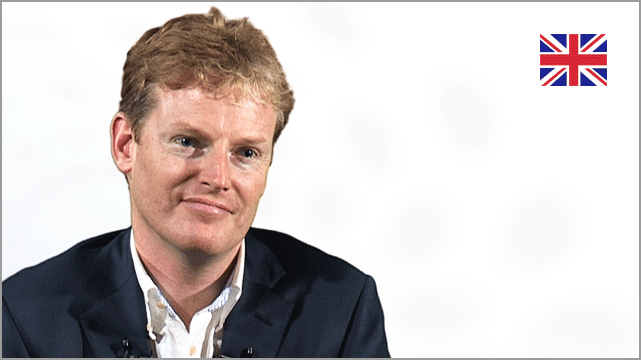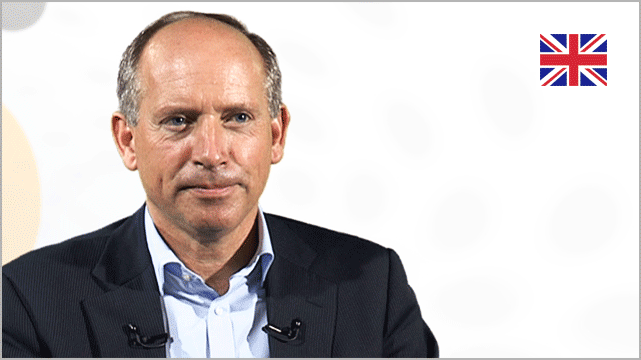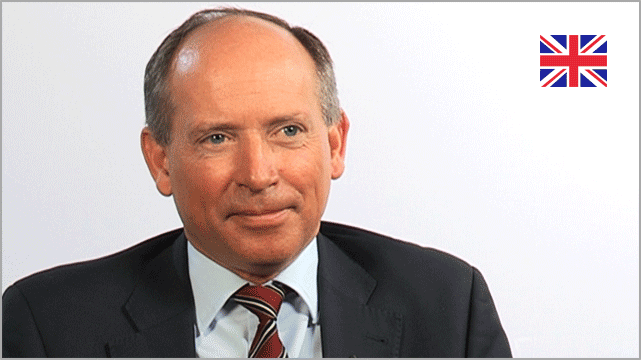EuroBusiness Media (EBM): We are talking now with Ian Cheshire, the Chief Executive of Kingfisher, Europe’s leading home improvement retailer and the world’s third largest. Ian welcome, you’ve completed the second full year of a three-year programme to drive a step change in shareholder value and announced the next phase of your growth plan. The company has reported full-year pre-tax profits up 22% to £670 million with growth across all parts of the company. What, in your view, have been the key drivers of these results?
Ian Cheshire (IC): I think this year we’re seeing the second year of our “Delivering Value” programme which has really been a self-help programme. And the great thing that we have seen is the results across the board in all three major divisions. And then, also great progress on our working capital and our sourcing agenda. So it’s been very much a coherent effort over the last year rather than one single factor that has driven the results.
EBM: In the UK and Ireland total sales were down 2.4% to £4.3 billion over the year. However, you managed a double digit increase in retail profit in the region. How was this achieved?
IC: Well, the UK market and Ireland weren’t easy. Ireland had a particularly difficult period. I think B&Q did very well in the period to basically hold its top line and improve its margin and cost performance. We also saw positive contribution from Screwfix where profits dropped 25%. And we completed in the year the roll out of TradePoint which will be important for the coming year. I think what’s been really critical about the UK market is that we’ve decided that there isn’t much point in chasing unprofitable sales – let’s focus on the bottom line – so we’ve been really making sure that we, again, produce double digit bottom line through more intelligent trading.
EBM: B&Q’s sales densities are still quite low. What are you doing to drive the top line?
IC:I think B&Q's sales densities give us an opportunity and, obviously in a market going backwards, and being the market leader, it's hard to fight against that tide but we have done lot of work on range renewal, a lot of work on reinvesting on our stores and in service. And going forward I think what we’ll see is innovation in range. We’ll see a contribution from the TradePoint, if you like, network which is now fully in place and this is really its first full year of trading. And we’re also going to benefit from the other operating companies in the group bringing product ideas and ranges to the UK. So, very focused now that the stores are in good shape in the UK on driving the top line.
EBM: You refer to “significant economic headwinds” that you’ve encountered. Economists are far from satisfied that these headwinds are over. How do you see the next year or so?
IC: Well, I think we can see that the UK is going to have a pretty challenging 2011, particularly in the first half when the government’s various economic measures begin to have an impact. However, I think for the year as a whole there is still opportunity to see good performance, but it’s most likely that we’ll see a stronger performance in France than we will in the UK and continued high growth in some of our emerging markets. So we have to work harder again on the self-help agenda in the UK.
EBM: Now, you have outperformed in France. How has this been achieved?
IC: Well, we’ve seen really two different things going on with Castorama France and Brico Dépôt. Castorama France is really reaping the benefits of now 4 to 5 years of work on its ranges, and the innovation agenda has really driven our top line together with continued reinvestments in the stores to make sure we have the modern format in as many places as we can. Brico Dépôt has been really coming back from a pretty sharp slowdown in the construction industry in France and is also now, I think, seeing a momentum as it begins to refresh its ranges and sort of get back to basics a bit and just sharpen up its act, and I think there’s a lot more to come from that.
EBM: From what you’ve just said, can we expect more store openings in France?
IC: I think there are definitely opportunities for us in France for both brands, Castorama France and Brico Dépôt. There is probably more room for Brico Dépôt. There is possibly sort of up to 30 to 50 stores that we could open. And Castorama, although it has larger stores, which means it takes longer to get planning permission, still has many catchment areas that it could go to. So we think there’s a good steady infill opportunity in France.
EBM: In other international markets you’ve seen terrific growth in some areas as you continue to roll out in East Europe including Poland, Russia, and Turkey where you operate a joint venture with Koçtaş. Will you expand into other countries or is it now a question of consolidation in that division?
IC: I think for the other international division, the priority is to go deeper into the existing countries, and there is a lot of opportunity left. Poland, our biggest non-UK and France market, is at 59 stores, whereas the potential is probably over 120-125. So there are many years of opening to come. Russia and Turkey are also doing well and we think there’s a lot more to go for. And, I think, while we will look at new markets internationally over a 5 to 10-year cycle, the first sort of 5-year focus needs to be on getting more out of we’ve got, particularly in China and Russia where there is great potential but not yet has demonstrated format.
EBM: You mentioned China. You’ve acknowledged that there are many issues there. Are you committed to staying in China?
IC: Well, China has now become the second largest economy in the world, and we know that consumer demand is going to be set for a 10 or even 20 year growth pattern. Our challenge has been how to create a profitable business model in China, and we’ve made a great first step by effectively getting back to breakeven after losing nearly £50 million a year several years ago. What we now have to do is really work on our retail format and we’ve got a lot of work underway, particularly around Shanghai, to really test how much we can get out of that market. And as soon as we can know that we’ve got a model, then we can make those sorts of decisions. So over the next year, I think we’ll be much clearer over with this.
EBM: You are well over halfway through your three-year programme called “Delivering Value”. Are you ahead of where you thought you would be when your plan was announced back in 2008?
IC: Yes, we are probably ahead. I mean, we’ve set a series of profit targets, and actually Year 3 targets look like they’ll be met, according to the market this year. I think where we have made probably more progress than I thought is in a couple of areas including reducing our debt. We have eliminated £1.6 billion of debt and we’ve seen profits up 88% over that period. But we have got another year of Delivering Value to go. So we’re not taking the foot off the pedal in that sense, and we have to focus on making sure that we actually finish that plan as opposed to leave it half way through and start doing something else.
EBM: You’ve announced that you are to start the next phase of your growth plan. Can you tell us more about it and how it follows on from the Delivering Value programme?
IC: I think Delivering Value gave us the foundation and, if you like, the right to just go on to the next stage. So we have to do quite a lot of work in getting the business back up to acceptable levels of return, but we haven’t yet really finished the potential of Kingfisher. So, the idea of Creating the Leader really says that we have attractive markets around the world, we’ve got developed markets where we think we can unlock further growth, really by making it a lot easier for our customers to do home improvement. And if we get through ranges, through classes, through bring-down-the-price and a whole set of areas, we’ve also got the developing markets which were part of Delivering Value which will carry on and will give us another element of growth. But we think, if we can make it easier for customers, we build a common core across what are still quite divergent different country operations, which means we get the benefits of our scale more efficiently, and we move to more of an 80:20 common model, and then we can expand the business. We think there is a lot more top-line growth to go for, still on the self-help basis, though; we’re not counting on the market to help us out. This is about our agenda for the next 5 years and us creating that value.
EBM: Now, we’ve heard about common ranging before. Why will it be different this time?
IC: Well, we are still in the very early days of common ranging, and we’ve only got probably about 1% of our purchases that are actually truly common. So we think we’re at the start of a pretty long journey. And the common ranging, I think, can happen this time because of the way we’re running the business, differently. Instead of trying to create some big central bureaucracy, we’ll simply let everyone be decentralized and hope that something happens. We’re actively building a sort of a one-team culture in the business and networking the business together. So, for example, in terms of the developing the range, it’s not me sitting in Paddington telling people what to do. It’s the commercial director in France, the commercial director in the UK sitting down and figuring out – commercially – what is the best range we can possibly come out with, which we can then have 80% common in the two countries. This still leaves room for adaptation because retail is local, but it does mean that we harness the power of our £10 billion sales much more effectively than we can today.
EBM: Do you think this new initiative will create the same sort of benefits that have already been seen to date from Delivering Value?
IC: Well, we’ve also put in place a new incentive plan for the senior management, which will be followed all the way down into the business over the next few years, which is based on a target earnings requirement but also a return on capital requirement. Now, if we look at those targets for the first three years, to max out that implies a 15% compound annual growth every year for next three years. If we do that, then it looks like we can create another £3-£4 billion of value for our shareholders.
EBM: And finally, how will you signpost to the market the progress being made from this next phase?
IC: What we’ve started to announce is really the broad themes of our strategy for the next phase, partly because this is still delivering value here and we want to focus on that. But as of September, and then in March next year, we’ll lay out KPIs and milestones and plans which will make this, if you like, more on detail but the direction will remain the same as we announced today.
EBM: Ian Cheshire, Chief Executive of Kingfisher, thank you.
IC: Thanks very much.




